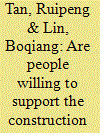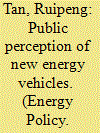|
|
|
Sort Order |
|
|
|
Items / Page
|
|
|
|
|
|
|
| Srl | Item |
| 1 |
ID:
177501


|
|
|
|
|
| Summary/Abstract |
Under the background of removing the subsidies for the new energy vehicles step by step and increasing the subsidies for the charging facilities in China, getting a comprehensive understanding on public's perception and attitudes towards new energy vehicles and charging facilities is significant to the policymakers. To fulfil these goals, we design and perform a random survey in Beijing, Shanghai, Guangzhou and Shenzhen, the four first-tier cities in China from July 2019 to December 2019. In the survey, we not only investigate the public's attitudes to new energy vehicles but also ask the willingness to pay (WTP) for the use of charging facilities. We find that those persons who are male, younger or having higher family monthly income are willing to pay more for the use of charging facilities. If the interviewee has better knowledge about the new energy vehicles or considers that the new energy vehicles can improve the air quality, he/she also would like to pay more. Finally, the WTP for the charging facilities is estimated to be 0.836 yuan/kWh extra and WTP for different group of interviewees is also analyzed. Therefore, in the initial development of charging facilities, subsidies are necessary but they should be removed later.
|
|
|
|
|
|
|
|
|
|
|
|
|
|
|
|
| 2 |
ID:
168329


|
|
|
|
|
| Summary/Abstract |
In order to promote the development of new energy buses more smoothly, a random survey of public perception on new energy vehicles and willingness to pay for new energy bus fares is conducted in four first-tier cities in China. We design two sets of questions in the survey and adopt a sample selection model to correct the possible sample selection bias in the estimation of willingness-to-pay for new energy fares. The results show that firstly in the zero willingness to pay samples, very few of them are with genuine zero, the others all being protest respondents. Second, the sample selection model indicates that the sample selection bias is positively significant in the estimation of willingness to pay. Third, income, people's knowledge about new energy vehicles, the degree of recognition of the role of new energy vehicle in improving urban air quality, and views on air quality influence willingness to pay more for new energy bus fares positively. We propose that pricing new energy bus fares higher is reasonable and more knowledge concerning new energy vehicles should be disseminated to the public.
|
|
|
|
|
|
|
|
|
|
|
|
|
|
|
|
| 3 |
ID:
177417


|
|
|
|
|
| Summary/Abstract |
Several measures in China are adopted to control the energy price so as to promote economic development. Energy allocation distortions are thus resulted in, which further do harm to both the economic output and efficiency. In this paper, we empirically analyze the impacts of removing energy allocation distortion on economic output and energy efficiency in China. First, we calculate the distorted amounts of energy in primary, secondary, tertiary industries and whole China. Then we analyze the relative and absolute energy allocation distortion among different sectors. Finally, we investigate the impacts of eliminating energy distortion on both economic output and energy efficiency. We find that the actual energy consumptions in primary and tertiary industries are less than those if there were no distortions. The case of secondary industry is on the contrary. Removing the energy allocation distortion can promote the increase of both economic output and energy efficiency. These findings demonstrate that eliminating energy allocation distortion is still a main task for Chinese government, and it will help to conserve energy globally.
|
|
|
|
|
|
|
|
|
|
|
|
|
|
|
|
|
|
|
|
|